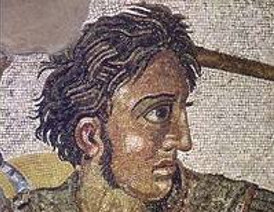He cites the legendary warrior Alexander the Great that reached an almost divine status in his lifetime despite dying in his early thirties. He is credited with changing the history of civilisation and shaping the present world as we know it.
According to Vries the qualities that made Alexander stand out from a young age were being magnanimous toward defeated enemies and extremely loyal toward his friends. As a general, he led by example, leading from the front.
Dissecting Alexander’s reign the Insead professor found that a number of important leadership lessons are still valid for today’s MBA students that strive to one day become visionary business leaders.
1. Have a compelling vision
Alexander’s actions demonstrate what can be accomplished when a person is totally focused – when he or she has clarity coupled with a ‘magnificent obsession’. He spoke with dramatic gestures and great rhetorical skills and appealed to the collective imagination of his people.
2. Be unsurpassed in execution
Alexander not only had a compelling vision, he also knew how to make that vision become reality. By maintaining an excellent information system, he was able to interpret his opponent’s motives and was a master at coordinating all parts of his military machine. He knew the true value of the statement “One is either quick or one is dead!”
3. Create a well-rounded executive team
Alexander also knew how to build a committed team around him and operated in a way that allowed his commanders to build on each other’s’ strengths.
4. Walk the talk
Alexander set the example of excellence with his leadership style; he led his troops quite literally from the front. When his troops went hungry or thirsty, he went hungry and thirsty; when their horses died beneath them and they had to walk, he did the same.
5. Encourage innovation
Alexander realised the competitive advantage of strategic innovation, his war machine was the most advanced of its time.
6. Foster group identification
Alexander created a very astute propaganda machine to keep his people engaged. His oratory skills, based on the simple language of his soldiers, had a hypnotic influence on all who heard him. He made extensive use of powerful cultural symbols which elicited strong emotions.
7. Encourage and support followers
Alexander knew how to encourage his people for their excellence in battle in ways that brought out greater excellence. He routinely singled people out for special attention and recalled acts of bravery performed by former and fallen heroes, making it clear that individual contributions would be recognised.
8. Invest in talent management
Extremely visionary for his time, Alexander spent an extraordinary amount of resources on training and developing current as well as future generations.
9. Consolidate gains
Paradoxically, three of Alexander’s most valuable lessons were taught not through his strengths but through his weaknesses. Alexander failed to put the right control systems in place to consolidate gains and thus never really savoured the fruit of his accomplishments.
10. Succession planning
Another lesson Alexander taught by omission is the need for a viable succession plan. He was so focused on his own role as king and aspiring deity that he could not bring himself to think of the future when he was gone. As a result, political vultures tore his vast empire apart after his death.
11. Create mechanisms of organisational governance
The final lesson that the case of Alexander illustrates (again by omission) is the paramount importance of countervailing powers. Alexander began his reign as an enlightened ruler, encouraging participation by his ‘companions’ - loyal soldiers drawn from the noble families in Macedonia. But like many rulers before him, he became addicted to power. As time passed,Alexander’s behaviour became increasingly domineering and grandiose losing touch with reality.
Read more at Knowledge Insead

